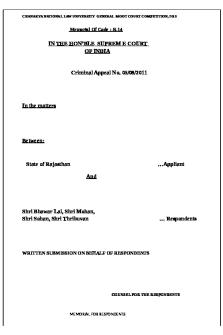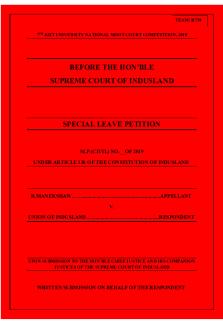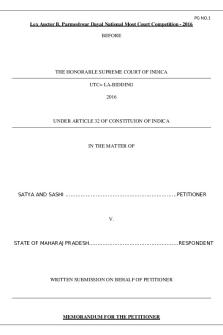Moot Speech PDF

| Title | Moot Speech |
|---|---|
| Course | Torts B - Negligence |
| Institution | James Cook University |
| Pages | 3 |
| File Size | 57.5 KB |
| File Type | |
| Total Downloads | 34 |
| Total Views | 87 |
Summary
Moot Speech Respondents sit on the left table. As the judge enters, counsel rise and bow to the judge she reaches the bench, and the judge bows in return. The judge and counsel then sit. The judge will then nod to senior counsel for the appellant, who then rises to introduce himself or herself and j...
Description
Moot Speech Respondents sit on the left table. As the judge enters, counsel rise and bow to the judge she reaches the bench, and the judge bows in return. The judge and counsel then sit. The judge will then nod to senior counsel for the appellant, who then rises to introduce himself or herself and junior counsel. Counsel for the appellants then sit. Senior counsel for the respondent then rises and makes introductions in the same way. May it please the court, my name is Zara Spencer and I appear with my learned Junior, MS C. POCOCK, for the Respondent. Respondent sits. Judge will indicate to senior counsel for the appellant to begin. Senior counsel then rises, and begins to address the court. After completing his or her submissions, senior counsel for the appellant should state: “That concludes my submissions on behalf of the appellant, your Honour”. The judge will ask questions to the senior counsel, Then judge will say “Thank you ______” The junior counsel will then rise to present the rest of the case. When junior counsel has finished presentations, he or she will say “That concludes the case for the appellant, your Honour”, and will remain standing to receive questions, sitting once thanked by the judge. Judge will then indicate for Senior council for respondent to begin their submission.
1.1, 1.2- Your honour I submit that upon the facts, the relationship between the Respondent as an occupier of the premises in issue, presents with it no legal duty to protect the Appellant as a lawful entrant of the premises, from the actions of third party criminals. It is not in issue that as an occupier, the Respondent owes a duty to the Appellant. The debate concerns the nature of the duty that has arisen from the circumstances. The Respondent in his duty as an occupier is only liable for the static condition of the premises and since the lights on the premises are in issue, a duty would only arise where inadequate lighting had resulted in the harm of the Appellant due to a default in the condition of the car park. 2.1, 2.2, 2.3- Your honour it is submitted that when the relationship between the parties are then considered as one between the Appellant and a body of statutory authority, the respondent is not liable to owe a duty, merely because within its scope it has the power to prevent the harm. It is not for the community at large to decide the particular way in which a statutory function should be performed, if this were the criterion then it would displace the intention of the legislation to
confer a discretion, rather then a duty. The design of the legislation that governs this body of statutory authority is not purposed to prevent injury to such an extent that adequate steps could not have been taken on the part of the accused. The act of Parliament to confer this policy indicates that it was not purposed to create a right to compensation. If the decision by the Respondent not to exercise a power was a rational decision, then the common cannot impose a duty to exercise that power because it must conform to legislative intention. 3.1, 3.4- It is not in issue that the type of have that eventuated was not foreseeable, the existence of the risk is not sufficient to impose a duty upon occupiers to protect lawful entrants from the unpredictable behavior of third party criminals. The extension of such a duty would conflict on the common law rule that one person has no duty to rescue another. A person cannot be held liable for the omission to help someone who is in peril. 3.2, 3.3- Furthermore, I submit that the Appellant made the conscious decision to decline assistance from her acquaintance shifted the responsibility from the Respondent as she walked back to the hall on her own. Upon the facts, it was determined that the criminal party was present in the car park at that particular time because of the knowledge that they had in reference to the meeting that had subsequently taken place at the hall. It is far-fetch for the Appellant to have relied on the lights as a means of deterrence from such criminal party, as the purpose of their being there surrounded the community disapproval for the development that was discussed at the hall meeting. If the duty was imposed upon the Respondent to take reasonable steps to prevent any criminal conduct of third parties, then leaving the lights on all night would have been reasonable in the circumstances, but it would remain that the acts of the third party criminals were still uncontrolled by the Respondent. Your honour it is our final submission is that the Respondent does not owe a duty of care to the Appellant. At the conclusion of the case for the respondent, the judge may, dependent on time constraints, ask senior counsel for the appellant whether he/she wishes to exercise a right of rebuttal. If senior counsel feels that the respondent made points which counsel for the appellant did not cover during their presentation, he/she has a maximum of 2 minutes to
rebut these points. Note that the right of rebuttal is used only if counsel for the respondent has raised something new. It is not used by counsel for the appellant to repeat arguments already presented....
Similar Free PDFs

Moot Speech
- 3 Pages

Moot speech media law assessment
- 4 Pages

Moot 1 - moot topic 1
- 3 Pages

Moot script 2 - moot tuto
- 1 Pages

Moot court memorial for moot problem
- 32 Pages

MOOT Memorial Respondents-1
- 36 Pages

Contract moot 21/25
- 8 Pages

92106489-Moot-Court-Memorial
- 20 Pages

\'R739\' - Moot memorial
- 34 Pages

moot court memorial 2
- 30 Pages

Compendium of moot competition
- 50 Pages

10 Role of Moot Court
- 4 Pages

Senior Moot Problem CG
- 3 Pages

Moot memo for Surrogacy
- 28 Pages

Moot notes - Example of mooting
- 3 Pages
Popular Institutions
- Tinajero National High School - Annex
- Politeknik Caltex Riau
- Yokohama City University
- SGT University
- University of Al-Qadisiyah
- Divine Word College of Vigan
- Techniek College Rotterdam
- Universidade de Santiago
- Universiti Teknologi MARA Cawangan Johor Kampus Pasir Gudang
- Poltekkes Kemenkes Yogyakarta
- Baguio City National High School
- Colegio san marcos
- preparatoria uno
- Centro de Bachillerato Tecnológico Industrial y de Servicios No. 107
- Dalian Maritime University
- Quang Trung Secondary School
- Colegio Tecnológico en Informática
- Corporación Regional de Educación Superior
- Grupo CEDVA
- Dar Al Uloom University
- Centro de Estudios Preuniversitarios de la Universidad Nacional de Ingeniería
- 上智大学
- Aakash International School, Nuna Majara
- San Felipe Neri Catholic School
- Kang Chiao International School - New Taipei City
- Misamis Occidental National High School
- Institución Educativa Escuela Normal Juan Ladrilleros
- Kolehiyo ng Pantukan
- Batanes State College
- Instituto Continental
- Sekolah Menengah Kejuruan Kesehatan Kaltara (Tarakan)
- Colegio de La Inmaculada Concepcion - Cebu
